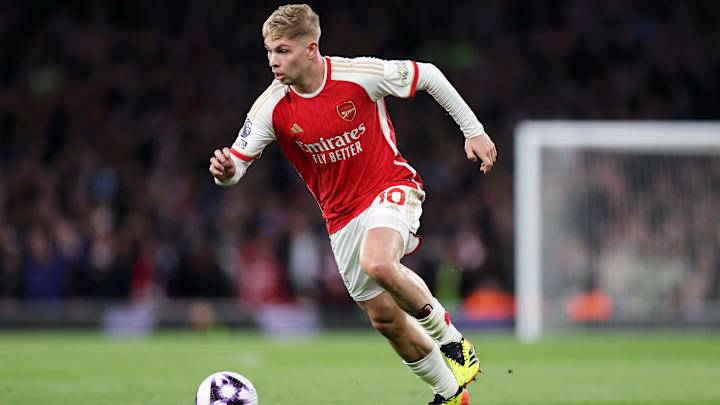There was a time, not so long ago, when a midfielder as creative as Emile Smith Rowe wouldn't be allowed out the door at Arsenal. That time has passed, with the No. 10's impending move to Fulham a sign of how the Gunners' style has changed under Mikel Arteta.
The change in style can best be summed up by muscle over technique. Not brawn over brains, but something close to it.
Arteta has made being bigger and stronger Arsenal's priority. Technicians are welcome, but the select few should expect to be lonely. Just ask Martin Odegaard.
The Arsenal skipper is the creator-in-chief of Arteta's team, but Odegaard acts on an island. His flair and vision release the direct pace of Bukayo Saka and Gabriel Martinelli, or the running power of Declan Rice and Kai Havertz. If those players can't outmuscle defences, Thomas Partey and Gabriel Jesus will give it a try.
Odegaard should get used to hearing his own voice echo off the walls of the creative department, because Arsenal and Fulham "are close to reaching an agreement" for Smith Rowe, according to The Athletic's David Ornstein.
Smith Rowe will be fantastic for Fulham and should be a smart bargain for every discerning fantasy football manager this season. The proposed £35m fee
for Arsenal is snappy business for a Hale End academy grad, but there's something bittersweet about ESR's move to west London.
It marks the end of an era.
Arsenal value power over playmakers
There'll be no more of like-minded technicians combining in intricate and attractive patterns. Those were the days of Arsene Wenger. Well, at least the latter days, when platoons of playmakers shared the pitch and created liquid football.
Whether it was Cesc Fabregas, Tomas Rosicky and Samir Nasri, or Santi Cazorla, Jack Wilshere and Mesut Ozil, Arsenal's teams were once defined by the elegance of their many schemers. Smith Rowe actually emerged on the watch of Unai Emery, but he always performed like a true Wenger player.
Gifted feet and neat touches allied with quick and clever decisions in the final third to make Smith Rowe a natural No. 10. His inventive spark helped fashion some memorable team goals, like this pearler against Tottenham in 2021.
Ramsdale ➡️ Xhaka ➡️ Smith Rowe ➡️ Tierney ➡️ Auba ➡️ Smith Rowe ➡️ Auba ➡️ ⚽️#ARSTOT pic.twitter.com/lzFmJq4O39
— Arsenal (@Arsenal) September 26, 2021
This was less than a year after Smith Rowe had saved Arteta's bacon with a star turn to beat Chelsea at an Emirates Stadium cleared out by Covid. It looked like the genesis of a special talent who would underpin Arteta's whole revolution.
Things never worked out that way, but it's too easy to blame injuries and Odegaard's arrival for Smith Rowe's decline. Instead, it's best to focus on the contradictions within Arteta's managerial makeup.
The Arsenal boss is a strange amalgamation of the two biggest influences on his career. His playing days under Wenger, along with time spent on Pep Guardiola's coaching staff.
At times, it's easy to imagine the powerful sways of both influences buffeting Arteta in different directions. Consider how Wenger used to hate stacking talent at the same position. Perhaps that motivated the decision to sell Smith Rowe, rather than have the 23-year-old remain Odegaard's understudy.
That's a solid theory, althought it's just as plausible shipping out ESR is Arteta's way of clearing the decks to somehow salvage his considerable investment in Fabio Vieira. A similarly minded maestro to Smith Rowe, Vieira has a keen eye for a through-pass, but he needs to get onto the pitch more often.
It's tough to see that happening, with Simon Collings of The Standard reporting Arteta is already lining up Mikel Merino as a midfield reinforcement. Merino is a 6-foot-plus disruptor who loves a duel.
Mikel Merino was the only player in Europe's top seven leagues to win 300+ duels during the 2023/24 season.
— Squawka (@Squawka) May 31, 2024
Call him Yu-Gi. 🤺 pic.twitter.com/V00vgJ0IMW
A player with Merino's physical profile and style fits part of the Guardiola blueprint. Namely, the part about unleashing a swarm of relentless hunter-gatherers out of possession.
Guardiola also likes to put multiple creative types onto the pitch, but Arteta is going another way. Fortunately, that way has made Arsenal champions in the past.
Arteta's style change can win titles for Arsenal

The irony here is some of Wenger's best teams were built more for power and speed than elaborate artistry. Those 97/98 double winners could overwhelm via brute force, albeit with plenty of Dennis Bergkamp magic added to the mix.
Wenger's great sides unleashed thundering herds comprised of powerhouses and hard chargers like Patrick Vieira, Gilberto Silva and Ray Parlour. Of course, those same teams enjoyed the balance provided by Thierry Henry's flair, Robert Pires' sophisticated swagger and Freddie Ljungberg's impish intelligence.
No such symmetry existed during the Fabregas and Ozil eras. Arteta hasn't attempt to redress the balance, so much as he's sought to restore it with a healthy dose of solidity to underpin considerable style.
It's still the formula for winning titles. Especially since, despite modern observers liking to pretend otherwise, the Premier League remains a rough and tumble environment where often only the strongest survive and thrive.
Arteta may have sacrificed his own personal saviour in pursuit of a beefier grand design, but Smith Rowe and Arsenal should both enjoy greater success without each other.
